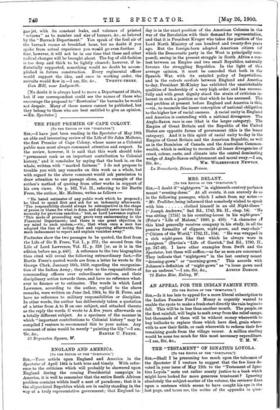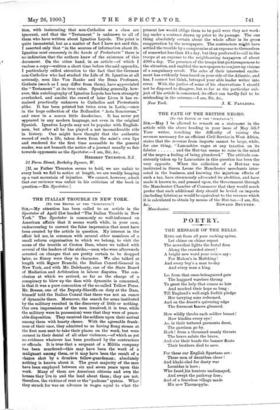THE " TESTAMENT" OF IGNATIUS LOYOLA.
[TO IRS EDITOR OF THE "SPECTATOR."] Sin,—Shall I be presuming too much upon the tolerance of the Spectator if I venture to suggest that the few lines de- voted in your issue of May 12th to the "Testament of Igna- tius Loyola" mete out rather scanty justice to a book which might have looked for more generous treatment ? Ignoring absolutely the subject-matter of the volume, the reviewer fixes upon a sentence which seems to have caught his eye in the last page, and taxes me, the writer of the appendix in ques-• tion, with insinuating that non-Catholics as a class are ignorant, and that the " Testament " is unknown to all of them who have written about Ignatius Loyola. The point is quite immaterial, but as a matter of fact I have not said this. I asserted only that "in the sources of information about St. Ignatius most commonly in the hands of Protestants" there is no indication that the authors knew of the existence of this document. On the other hand, in an article—of which I enclose a copy—written a short time before the said appendix, I particularly called attention to the fact that the German non-Catholics who had studied the Life of St. Ignatius at all seriously, men like Von Ranke and the Bonn Professor, Gothein (much as I may differ from them), have appreciated the " Testament " at its true value. Speaking generally, how- ever, this autobiography of Ignatius Loyola has been strangely overlooked, and amidst the crowd of later Lives it has re- mained practically unknown to Catholics and Protestants alike. It has been printed but twice even in Latin,—once in the huge collection of the Bollandist " Acta Sanctorum," and once in a scarce little duodecimo. It has never yet appeared in any modern language, not even in the original Spanish. Ignatius Loyola may not be popular with English- men, but after all he has played a not inconsiderable role in history. One might have thought that the authentic record of such a life, taken down from the saint's own lips and rendered for the first time accessible to the general reader, was not beneath the notice of a journal usually so fair towards opponents as the Spectator.—I am, Sir, &c., [If, as Father Thurston seems to hold, we are unfair to every book we fail to notice at length, we are weekly heaping up a vast mountain of injustice. We cannot, however, admit that our reviewer was unfair hi his criticism of the book in question.—En. Spectator.]







































 Previous page
Previous page